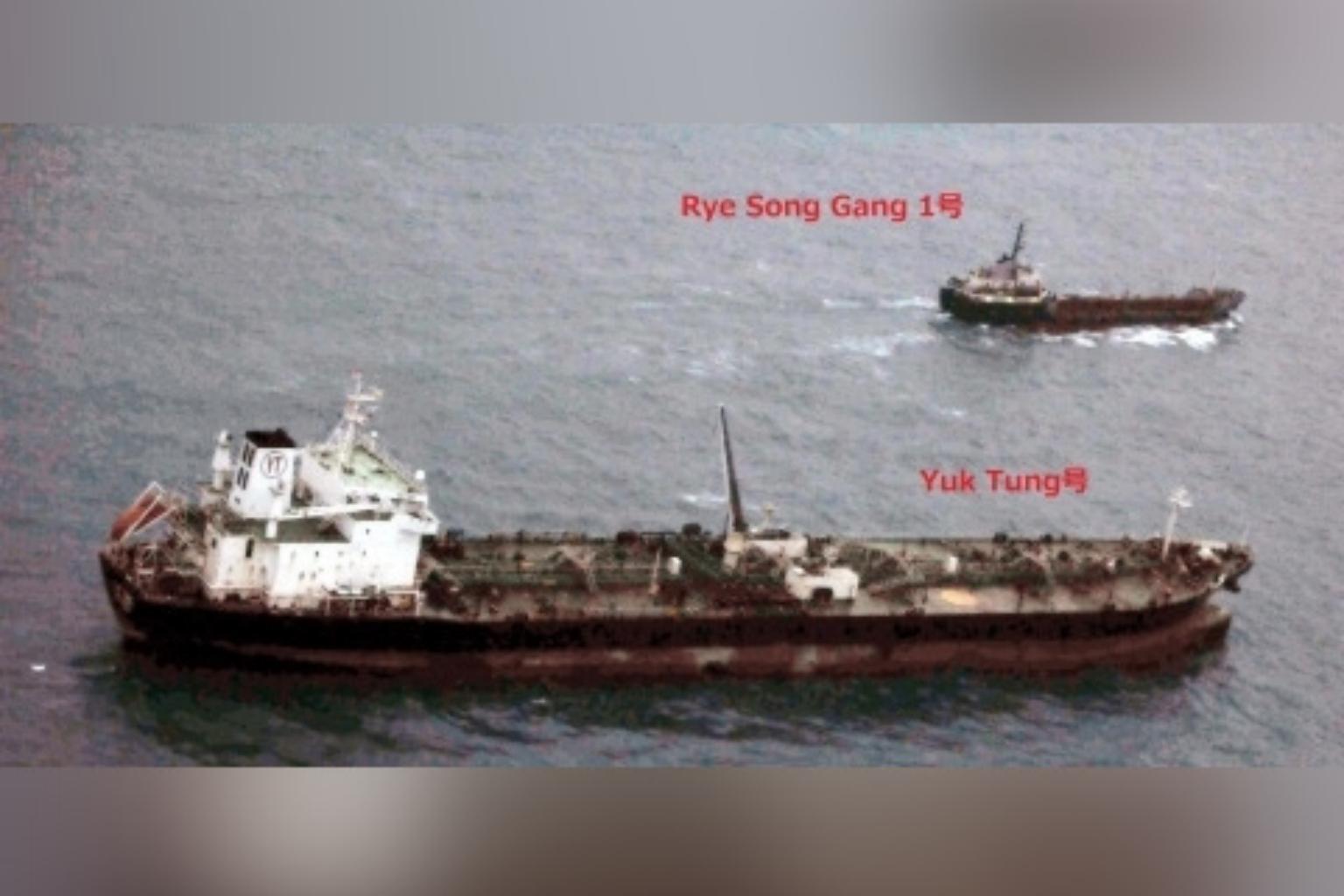Director of S'pore firm accused of trading gas oil with North Korean ship jailed for obstructing justice
Sign up now: Get ST's newsletters delivered to your inbox

Japan reported that a ship chartered by Manfred Low Cheng Jing's firm carried out a transfer with a North Korean vessel.
PHOTO: MINISTRY OF FOREIGN AFFAIRS OF JAPAN
Follow topic:
SINGAPORE - A company director threw away his iMac computer and his mobile phone to hide evidence after media reports that a ship chartered by his firm had provided gas oil to a North Korean ship at sea.
On Tuesday (June 7), Manfred Low Cheng Jing, 31, was jailed for 15 weeks for one count of obstructing justice. Another similar charge was taken into consideration for his sentencing.
Low was a director of Yuk Tung Energy (YTE), a Singapore company involved in oil trading and bunkering.
The vessel that it chartered, MT Yuk Tung, made headlines after the Japanese Ministry of Foreign Affairs issued a statement on the suspected illegal ship-to-ship transfer of gas oil between the vessel and Rye Song Gang 1, a North Korea-flagged vessel, in the East China Sea on Jan 20, 2018.
Under United Nations regulations, ship-to-ship transfers of all refined petroleum products to or from North Korea-flagged vessels are prohibited.
On Jan 26, 2018, the Commercial Affairs Department (CAD) here received information of YTE's suspected involvement in the case.
A director and shareholder of YTE, Benito Aloria Yap, removed physical documents related to YTE by placing them in cardboard boxes in a car.
Yap is currently at large.
He instructed staff to remove items from the office, including Low's iMac computer, which contained information on the company's operations.
On Feb 2, 2018, the CAD raided YTE's office and did not find Low's computer.
The next day, Low and other officers of YTE met Yap in Johor Bahru to discuss how to respond to the media reports.
Between January and February that year, Low threw his computer into an unknown dumpster. He knew that the computer contained information on YTE that would be relevant to investigations.
"(Low admitted he) was afraid that the police would find potentially incriminating evidence in the iMac computer because he knew that YTE's business operations were shady," said deputy public prosecutors Ben Mathias Tan, Regina Lim, Koh Mun Keong and Samuel Chew.
The CAD managed to obtain some information and documents on YTE's business operations, including spreadsheets on its oil sales. But the disposal of the computer hampered investigations and the CAD was unable to retrieve other information.
Low initially lied that his phone and laptop were destroyed after a car ran over his bag but later admitted that he had disposed of his mobile phone.
On Feb 13, 2018, the Singapore Government received a request from the UN Panel of Experts for information, including why there was a ship-to-ship transfer at sea, the type and amount of petroleum product transferred, and copies of the invoices, remittances and bank account details for the transaction.
The prosecutors told the court that Singapore's Ministry of Foreign Affairs (MFA) provided a statement noting that Low's offence of disposing of his iMac and phone had frustrated the authorities' ability to complete investigations into the potential violation of the longstanding sanctions against North Korea.
MFA said the offence subjected Singapore to international criticism and raised questions internationally about its commitment to legal obligations.
The ministry added that it also impacted how other Singapore companies are perceived in the global market since YTE was placed on the UN Sanctions List.
The prosecutors noted that at the time, North Korea was conducting an increasing number of missile and nuclear tests, and that Singapore had joined the international community's efforts to curb its growing nuclear activities by implementing the UN regulations.
Low’s lawyer, Ms Diana Ngiam, told the court that her client did not know that Yap had instructed staff members to remove his iMac computer from the office, and he found out only when they brought it to his home.
She added that while Low knew YTE’s business operations were “shady”, he was not aware they involved breaches of the UN’s North Korea regulations.
Noting that Low’s disposal of the iMac was not premeditated, Ms Ngiam said: “Our client panicked and reacted in the moment impulsively.”
For obstructing the course of justice, Low could have been jailed for seven years, fined, or both.
Low’s lawyer, Ms Diana Ngiam, told the court that her client did not know that Yap had instructed staff members to remove his iMac computer from the office, and he found out only when they brought it to his home.
She added that while Low knew YTE’s business operations were “shady”, he was not aware they involved breaches of the UN’s North Korea regulations.
Noting that Low’s disposal of the iMac was not premeditated, Ms Ngiam said: “Our client panicked and reacted in the moment impulsively.”
For obstructing the course of justice, Low could have been jailed for seven years, fined, or both.

